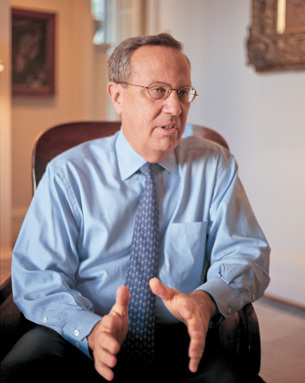 loading
loading
Q&A: Rick LevinEastern establishment Mark OstowView full image
Y: Yale is proposing a liberal arts college in Singapore to be run jointly with the National University of Singapore. One question we hear is “Why Singapore?”—especially given Yale’s connections with China. L: First, Singapore has the explicit goal of becoming an educational hub for all of Asia. It’s a small country that depends on the flow of talent into the country and on having close relationships with both China and India. We would be able to enroll students from all over Asia, whereas a campus in China or India would probably end up with 90 percent Chinese or Indian students. Second, English is an official language and is the language of instruction at NUS. This makes it easier to attract faculty with experience teaching in liberal arts settings. Third, NUS has been the most enterprising of Asian universities in developing strong working partnerships with foreign institutions. They have excellent programs in medicine with Duke, in engineering with MIT, and in law with NYU. Finally, Singapore is enthusiastic about moving in the direction of liberal arts education. That might be viewed as an interesting experiment in larger Asian countries, but in Singapore, the top leadership hopes and expects that this will become a key form of education for people who aspire to broad leadership roles in society. Y: How do you know that? L: The president of NUS came to us and first proposed the idea, and I have since heard strong expressions of support directly from Singapore’s top political leaders. The prime minister underscored the country’s interest in liberal arts education in his National Day address this summer. NUS has been exploring the possibility of a liberal arts college for three years. Y: What about academic freedom? In July, a British author of a book on capital punishment in Singapore was arrested there. L: The arrest prompted us to further extend our inquiry into the extent of academic freedom in Singapore. We found that students and faculty feel free to express themselves in the classroom and on campus, and that faculty publish articles in the scholarly literature on controversial subjects—articles critical of Singapore’s policies, and articles that deal with gender and sexuality issues. We also feel assured that there are adequate provisions in our draft agreement with NUS to ensure these freedoms for the college. There are, however, defamation and sedition laws governing public discourse in Singapore that are quite different from ours. Faculty and students going to Singapore would have to comply with the country’s laws, of course, and we would give them a full orientation to ensure that they know the rules. Y: Students here often form groups to influence government policy. Students there won’t be able to. L: That is another boundary that would have to be accepted. In deciding whether to go to Singapore, or China, or many other countries, the underlying question is this: should Yale withdraw from engagement with cultures with values and norms different from our own? Or should we engage, and hope that through conversation and interaction there will be some advance in mutual understanding? Very few countries offer the same freedoms we have in America. Even in most of Europe, free expression is constrained by much stronger libel laws. Y: Some critics say that Singapore is less interested in academics than in using Yale’s reputation as a cover for its autocratic regime. L: I disagree. As a knowledge-based economy that has no natural resources, Singapore’s main motivation is to improve the quality of education, attract talent to its educational institutions, and retain a significant number of the talented people educated there, in order to have strong industry, technology, and trade to keep the standard of living rising. Y: One question we hear from alumni and faculty is “What’s in it for Yale?” L: First, Yale students and faculty will have many opportunities to spend time in Singapore, to broaden their education and research. Second, I have great confidence that some of the curricular and extracurricular innovations in Singapore will be adopted or adapted here in the United States, and at Yale in particular. For example, designing a core curriculum that puts Eastern and Western civilizations in conversation has already inspired some of our faculty to think about how to use elements of such an approach here. Third, if we succeed in contributing to the transformation of higher education in Asia, Yale’s reputation for leadership will be strengthened and enhanced. This will help us attract the best students and faculty from Asia and around the world. Finally, by helping to introduce a powerful, innovative version of liberal arts education to Asia, Yale would be making a major contribution to the region. Yale has had a seminal influence on U.S. undergraduate education at least three times: through its widely imitated curriculum and pedagogy in the first half of the nineteenth century, by pioneering the development of the extracurriculum a half century later, and by adapting to America the concept of residential colleges in the 1930s. To lead a fourth round of major innovation in undergraduate education—this time in Asia—would be an exciting accomplishment. You could say, “That’s not what’s in it for Yale—that’s doing good for the world.” But doing good for the world is what Yale does.
The comment period has expired.
|
|